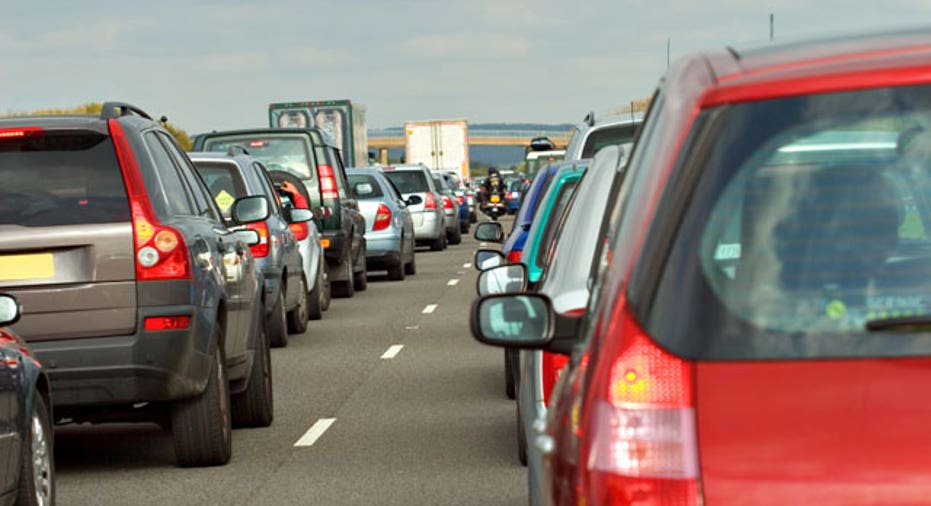Can You Blame Your GPS for Your Wreck?

Your GPS can lead you to water, but it can't make you drive into it. Or can it?
Some drivers have followed their navigation devices into lakes, against traffic onto one-way streets, and even onto railroad tracks.
Clearly such systems aren't foolproof, and as they have become ubiquitous on smartphones and in cars, more drivers blame the technology for their accidents. One survey estimated that the systems cause up to 300,000 accidents a year in England.
The legal world is still sorting out the questions of who ultimately pays for the consequences of bad directions. In the meantime, don't bother arguing that you're not at fault for a fender-bender simply because the GPS steered you wrong.
Your insurer isn't likely to be interested in any finger-pointing.
But it said to turn left …
"Your insurance company wants you to take reasonable care and use common sense," says CarInsurance.com consumer analyst Penny Gusner. "If you see there's a tree there and you turn into it, that's not common sense."
That doesn't mean your insurer won't pay. If you have the necessary coverage -- collision to repair your own car and liability to fix those of anyone you hit -- your insurance policy should pay no matter how you wound up in the wrong place at the wrong time, Gusner says.
But the record will show you as the at-fault driver, and your rates are likely to rise as a result.
"You are responsible for what you do behind the wheel of your car, and I don't see how you can transfer that duty from you to the GPS manufacturer," agrees Lynette Hoag, a Chicago insurance claims lawyer. "It's your duty to follow the rules, keep your eyes on the road and use reasonable judgment."
What do you want for free?
Back in 2010, Los Angeles native Lauren Rosenberg wanted to go for a stroll in Park City, Utah. She consulted the Google Maps application on her smartphone, which suggested she walk along Utah State Route 224.
Unfortunately, that particular road is a busy highway with no sidewalks, and she was struck by a passing car.
Rosenberg sued Google for providing dangerous walking directions, but in May 2011 a Utah district court dismissed the lawsuit. In the ruling, the judge concluded that the usual "duty" owed to a customer by a service provider did not exist in this case, as Google provides its walking directions as an unpaid service to the general public.
In theory, such a duty would indeed exist if you were a customer paying for navigation services -- which is exactly the case when it comes to GPS navigation systems.
'I agree' carries a lot of weight
Wrong-turn cases have made headlines when drivers have followed directions into bad weather or decrepit roads. Rangers at Death Valley National Park were so alarmed by a rise in what they call "death by GPS" that they contacted manufacturers to correct outdated maps that led travelers astray.
In situations where a death is caused by bad directions rather than inattentive driving, "it certainly seems like you'd have a much stronger case," says Hoag.
But Venkat Balasubramani, a lawyer specializing in technology issues, says that one immediate barrier to any product liability lawsuit is the fact that most navigation systems display a disclaimer when they're first activated.
For instance, a Garmin system warns users that "Failure to pay attention to the operation of your vehicle could result in death. … You assume total responsibility and risk for using this device." The user must click the "agree" button to move past the screen and get directions.
That's a contract, says Balasubramani, adding that an "agree" button gives the disclaimer more legal force than some fine print buried in the back of an instruction manual.
Of course, fine print has its limits, and Balasubramani notes that companies can't disclaim their responsibility to provide a safe product. A car manufacturer can't put fine print on the steering wheel insisting that it's not responsible for the performance of the airbag, for instance. But he says that a faulty navigation system probably wouldn't be viewed as a product safety issue.
"The product in question is pure information, so it would be viewed somewhat differently than, say, a lawnmower," he says. "Regardless of where you get your directions, you as a driver have some basic responsibility to avoid hazards on the road and keep your eyes open."
The original article can be found at CarInsurance.com:Can you blame your GPS?



















